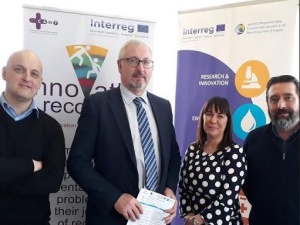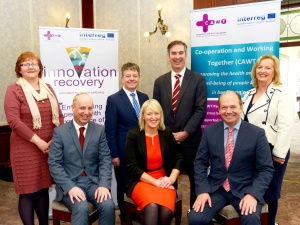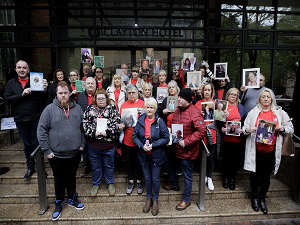
by Gráinne Connolly
A €7.6 million EU INTERREG VA funded cross-border project has been launched in response to the increase in numbers of people with mental health problems.
Over the next four years, the large-scale, cross border Innovation Recovery project offers an unprecedented opportunity to empower and enable people and communities to take greater control over their own mental and emotional wellbeing.
This EU funding allocation has been secured by the Co-operation and Working Together (CAWT) Health and Social Care Partnership.
The CAWT project partners are the HSE, the Southern Health and Social Care Trust, the Western Health and Social Care Trust, the Public Health Agency and the Health and Social Care Board.
The Belfast Health and Social Care Trust is also a project partner.

(Pictured at the launch of the EU funded €7.6 million cross border Innovation Recovery project which will see three cross border recovery college networks set-up to support people with mental health difficulties.
Back row (left to right) Bernie McCrory, Chief Officer, CAWT; John Meehan, Assistant National Director, Head of National Office for Suicide Prevention, HSE; Damien McCallion, National Director Emergency Management & Director General of CAWT and EdelO’Doherty, Deputy Chief Officer, CAWT.
Seated (front row / left to right): Jim Daly TD, Minister for Mental Health and Older People, Dept of Health Ireland; Brenda Hegarty, Programme Manager, Special EU Programmes Body and Michael McBride, Chief Medical Officer, Department of Health Northern Ireland.)
The recovery colleges will provide education as a route to recovery, with courses devised and delivered collaboratively by people with their own experience of mental illness along with mental health professionals.
By adopting this educational approach,alongside or as an alternative to more traditional therapeuticoptions, it is planned that those participating will be enabled to better understand their mental health. Ultimately, people will be supported to recover and to be able to create a satisfying and meaningful life for themselves.
Jim Daly TD, Minister for Mental Health and Older People at the Department of Health in Ireland and Dr Michael McBride, Chief Medical Officer at the Department of Health in Northern Ireland jointly announced the launch of this cross border initiative at an event in Dundalk recently.
Speaking at the launch, Minister Daly said:
“This is an important EU funded project which is taking a cross border approach to developing additional support services for those with mental health difficulties and I congratulate the CAWT partnership for securing the EU funding.
“TheInnovation Recoveryinitiative is taking a community-based approach by supporting peopleto better understand and manage their mental health within their own localities. The recovery ethos is one which the Department wholeheartedly embraces and is reflected in current policy and practice.”
Also speaking at the event, Dr McBride added:
“The Department is delighted to be launching this cross border mental health project.
"The aims and objectives of the project chimes with our priorities for a modern health and social care service, in particular the focus on early intervention and self-management. It is about giving people the tools and support to identify their needs in recovering from and managing their own mental health. It encourages participants to draw upon both their own personal resources and the support of the wider community.”
Welcoming the launch of the Innovation Recovery project, Gina McIntyre, CEO of the Special EU Programmes Body said:
“Improving access to more effective joined-up health and social care services for citizens, is one of the core objectives of the EU’s INTERREG VA Programme and will benefit thousands of people on a cross-border basis.
"This project represents a radical shift from traditional models of treatment for those with mental health problems, to a more collaborative-based approach that will allow people, on both sides of the border, to become active partners in their journey to recovery.
“It will also help challenge the silence and stigma that unfortunately prevents many people from coming forward to receive the help and support that they need.”
Adrian Corrigan, Assistant Director of Mental Health Services for the Southern Health and Social Care Trust said:
“The Innovation Recovery project complements and enhancesTrust mental health services and our community and voluntary partners,by empowering and supporting individuals and their families and the wider community through a learning, educational approach.
"At the heart of the recovery college approach is that the participants engage with and learn alongside those who have experienced similar mental health issues.”
DamienMcCallion, National Director Emergency Management &CAWT Director General of CAWTopened the launch.Other speakers at the launch event included Michael Ryan, Service Improvement Lead, HSE; Briege McClean, Peer Trainer, WHSCT and John McCormack, Scottish Recovery Network.
There will be a total of 3 recovery college locations across Ireland/Northern Ireland, each with a broad catchment area to ensure access by those geographically or socially isolated.
Furthermore, using technology, the recovery college services and courses will also be made available online, thus extending the impact of the project more widely. The three areas which will have new recovery college services are:
Area 1 West: Derry, Coleraine, Letterkenny, Strabane and West Donegal
Area 2 South: Cavan, Monaghan, Sligo, Leitrim and Fermanagh
Area 3 East: Dundalk, Belfast City, Armagh, Newry and Louth
During the project lifetime, 8,000 people will participate in mental health recovery education programmes.
300 mental health practitioners from statutory, voluntary and community sectors will be trained in recovery orientated methods.
Additionally, 500 staff fromnon-mental health services will be trained in mental health awareness and compassionate care of those suffering from mental health illness.
Match-funding for the project has been provided by both Departments of Health in Ireland and Northern Ireland.


 Investigation into ‘missing’ notes from key Executive meeting
Investigation into ‘missing’ notes from key Executive meeting
 Teenage girl killed in road crash named as Kamile Vaicikonyte
Teenage girl killed in road crash named as Kamile Vaicikonyte
 Covid-19 inquiry ‘an opportunity for candour’ from Stormont leaders
Covid-19 inquiry ‘an opportunity for candour’ from Stormont leaders
 UK and Irish ministers to meet amid row over migration
UK and Irish ministers to meet amid row over migration
 Three men set to go on trial for murder of journalist Lyra McKee
Three men set to go on trial for murder of journalist Lyra McKee